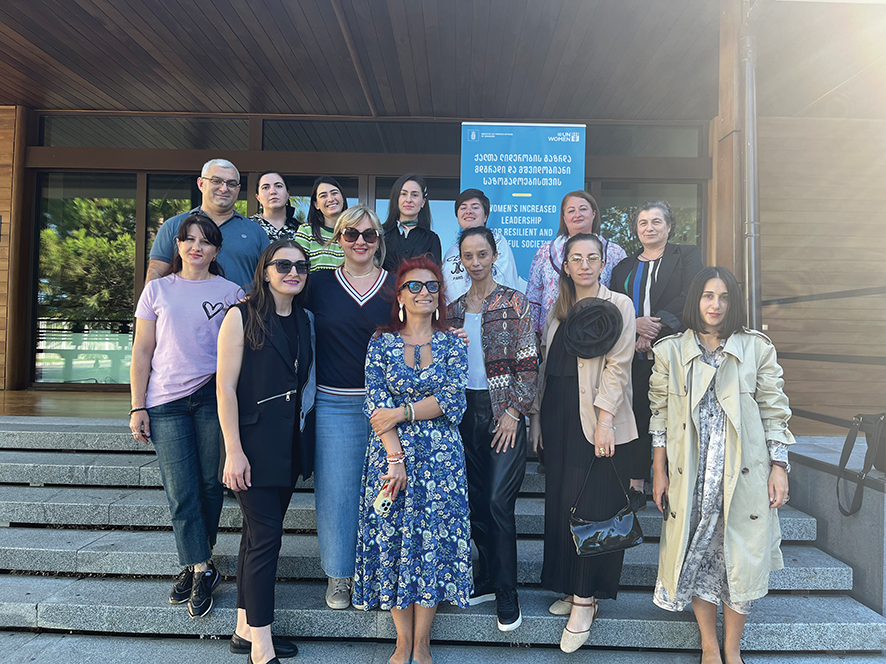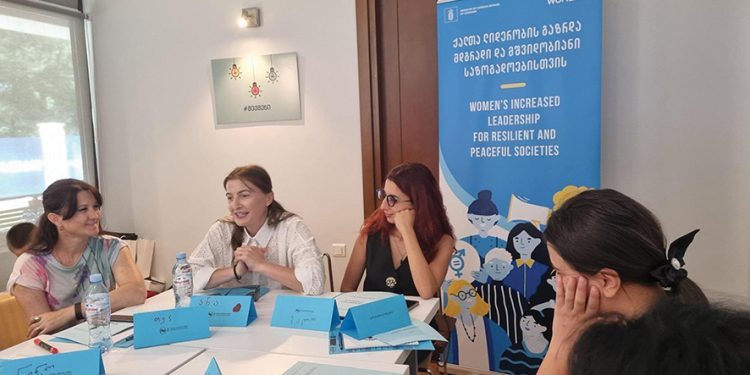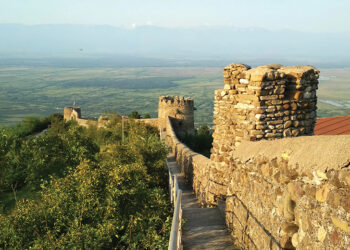The United Nations Entity for Gender Equality and the Empowerment of Women (UN Women) has launched a business course specifically for conflict-affected women in Georgia, which will provide them with the skills and tools necessary to launch businesses and increase community engagement within their cities.
Georgia has many people who live aalongside the Administrative Boundary Lines (ABLs) with Abkhazia, Georgia and Tskhinvali region/South Ossetia, Georgia. In these areas live numerous internally displaced and conflict-affected women. Portfolio Manager and Programme Specialist for Women, Peace, and Security at UN Women Country Office in Georgia, Tamar Lobjanidze, tells GEORGIA TODAY that, through assessments and different studies of the people in these areas, UN Women found that internally displaced and conflict-affected women are marginalized from policymaking processes, and are limited in accessing opportunities, including those in the economic and engagement fields.
To combat this situation, a business course called ‘Practical Course on Entrepreneurship – How to Start a Business’ was launched to support this specific group of women in their economic and empowerment opportunities. Lobjanidze tells us that the course is made up of two phases: the first consists of classes in accounting, business processes and how to plan them, tax codes and what to know going into the process, and preparation for writing business proposals such as grant funding. After the classes are completed, the second phase is initiated: a presentation of the developed business ideas, which the UN Women assesses to provide small grants for the women to start their small businesses.
“Internally displaced and conflict affected women living along the ABLs with Tskhinvali region/South Ossetia, Georgia or Abkhazia, Georgia face multiple barriers limiting their access to grants and programs, which is why this project aims to address these challenges. It focuses on supporting women with specific needs, particularly related to economic security, and offers targeted measures to assist them,” Lobjanidze says. “Otherwise, they will be excluded from this process.”
Ana Leponava is a participant in the business course from the Zugdidi Municipality in Western Georgia. She said the business idea she’s preparing and developing to pitch is in the field of handicrafts. Through her small business, she intends to sell embroidered items and accessories. Leponava told us that when she first heard about the course, she didn’t have a business idea, but rather wanted to participate to learn more about taxes, accounting, and general business planning. However, through training and support, an idea came to her.

“This course has boosted my confidence and motivated me to try starting my own small business,” she tells us. “Completing this course will positively impact my financial situation and the financial well-being of the women participating in this project.”
This project is a part of the 2022-2024 National Action Plan (NAP) of Georgia for Implementation of the UN Security Council resolutions on Women, Peace, and Security. The initiative was created to safeguard the rights of women and girls, including internally displaced and conflict-affected women residing in the vicinity of ABL villages. Lobjanidze noted that this is the fourth NAP currently in implementation.
In previous years, the business course was also implemented as part of the support to NAP. However, Lobjanidze tells us, the classes had to be held online due to COVID-19, so most women found it less effective or useful. She said the course was also missing parts that are now included, such as a grants mechanism.
This time around, Lobjanidze says they had information about the barriers to women’s participation, which allowed them to make the course more inclusive and flexible. She tells us that most women who participate have other outward responsibilities in addition to their jobs, so they don’t have much time to engage in learning activities designed for their empowerment and capacities. As a result, it was decided to hold the classes on the weekends, when most people are available, and to have them not in Tbilisi, which is hard to reach for most participants, but rather in the cities of Gori and Zugdidi to allow their access to skills development and learning, while addressing barriers of their participation, such as time poverty, access to transportation, finances, etc.
The application process for the course was also straightforward – a motivation letter and CV. Lobjanidze highlights that a major barrier for women is the challenge of completing comprehensive applications without access to email or the internet, especially if they lack prior IT skills. To address this, they aimed to simplify the application process as much as possible to eliminate any unexpected obstacles.
The Women, Peace, and Security (WPS) agenda is made of four pillars: participation, prevention, protection, and relief and recovery. Lobjanidze says internally displaced and conflict-affected women are very vulnerable and have experienced trauma also through living in post-conflict settings. Their remote living areas, being unconnected to central towns and cities, make engagement in social, economic, and political life a big issue.
To resolve this problem, UN Women’s WPS programming has taken a ‘local approach’, turning the NAP inward so conflict affected women from ABLs can work with government representatives – central and local – to exchange thoughts and ideas on certain human security issues in their areas, such as infrastructure, transportation, access to markets, etc., allowing them to engage in peace and security decision-making and create a peaceful environment where they live. This initiative is a part of the UN Women’s Incident Prevention and Response Mechanism (IPRM) information-sharing meetings.
“We established the network of grassroots women to connect those living in ABLs or IDP settlements, enabling them to advocate collectively and make their voices heard. Alongside creating economic opportunities, it’s crucial for them to have platforms to influence policies tailored to their unique needs, which differ significantly from those of women in other regions or Tbilisi. Their human security needs are closely tied to their economic circumstances,” Lobjanidze explains.
With previous NAPs, Lobjanidze says, this aspect was always missing – giving women agency and voice in governmental decisions – and now it has been implemented to allow them to have some influence over their lives. The first phase of the business course concluded on October 19 and 20 with a ceremony for the participants. The second phase will soon be initiated for business assessments and physical implementation of the businesses.
This project is run by UN Women in coordination with various government agencies, including the Office of the State Minister for Reconciliation and Civic Equality of Georgia and is supported by the Academy of the Ministry of Finance, the project is generously funded by the Ministry of Foreign Affairs of Denmark.
By Shelbi R. Ankiewicz














